Bennett Miller
BY ROB FELD
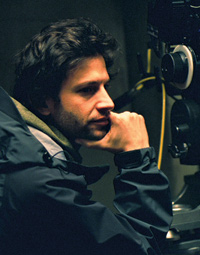 ENRAPTURED: For Bennett Miller, Barry
ENRAPTURED: For Bennett Miller, Barry
Lyndon
communicates on a very intimate level.
It's strange watching this film with someone," says Bennett Miller, sitting cross-legged in his New York loft, getting ready to watch Stanley Kubrick's
Barry Lyndon (1975). A string orchestration of Handel's ceremonious Sarabande accompanies the opening titles of the film, which Miller has decided to screen in preparation for a project he's developing called
Foxcatcher. "Experiencing this film feels like a private event. It communicates on such an intimate level, it reaches a place I don't really get to with people."
The unconventional film didn't awe Miller the first time he saw it, but he rediscovered it around 2000, and figures he's watched it every two years since, each time by himself.
"There is something very personal about it," he says. "It assumes you have a measure of life experience and buried existential concerns, and it just goes after them. It's not so much a film that you watch, it's something you relate to. It works on you. It hypnotizes you, disarms you with its spell, and makes you fluent in the unspoken dialogue and communicates what is unspeakable. It's so quiet and still and yet so loaded, wrought, and tense, it's like waking up in the death squeeze of a python. I love it."
Epic in scope, Kubrick's treatment of William Thackeray's 1844 novel methodically builds a tragic man, Barry Lyndon (Ryan O'Neal), from naïve young adulthood to middle age, cynicism, and ruination. After being tossed aside by a cousin with whom he had fallen in love, Barry flees his home in 18th-century Ireland and begins his sentimental education through a progression of adventures. He is robbed, joins the Queen's military, deserts, is conscripted into the Prussian army, falls in with a professional gambler and cheat, and seduces and marries a countess, taking piecemeal lessons in deceit, isolation, and manipulation until all he has managed to gain is lost, and his misdirected life is laid bare.
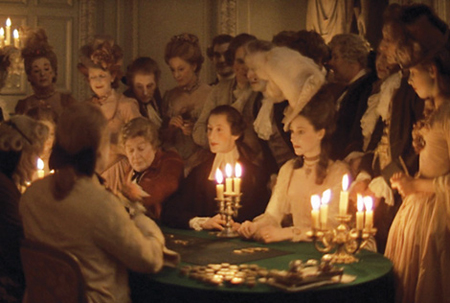 Kubrick used specially designed lenses and shot the film with only natural light.
Kubrick used specially designed lenses and shot the film with only natural light."The first shot establishes the style and manner in which the film communicates," observes Miller, watching the opening wide shot with narration depicting from a distance the duel in which Barry Lyndon's father is killed. "Immediately it couples the idyllic (it looks like a beautiful, composed painting), with the horrific (a murder). It shares undercurrents with 2001: A Space Odyssey, with the awesomeness of nature and man's creations, and how dwarfed and isolated the individual is within it.
"Kubrick's style might appear removed and dispassionate," Miller continues. "We're far away, on the other side of a wall and tree, can't see anybody's face, and the narrator's description of the murder couldn't be more aloof. But part of what makes this film so masterful is that the style itself creates the content; the story being told only amounts to so much. There's a chemical reaction that occurs between the style and the story, and that creates something completely its own. The filmmaking somehow manifests a consciousness from which we experience the story. The narrator tells a version from one perspective as the film drugs you into observing it in a very different way and on a completely different frequency; one that is wrenching and anything but detached."
It is in that next scene where Kubrick reveals Barry as a young man, seething with repressed lust as he plays cards with his more conspicuously lusty cousin, Nora (Gay Hamilton). In the softest of light and most patient of musical scores, Barry gazes at her longingly rather than ravishing her as he should, even after she attempts to draw him out by hiding a ribbon in her bosom for him to find.
"The intimacy of the shots, the steadfastness of the camera, and the pace of the action slowly stir the ingredients of eroticism and discomfort that mix to create the cocktail that is this scene," says Miller, his hands clasped in his lap, as though not wanting to disturb the stillness of the film. In fact, for its duration, Miller rarely budges from this position, largely motionless but coiled and frequently wincing with the tension the film elicits.
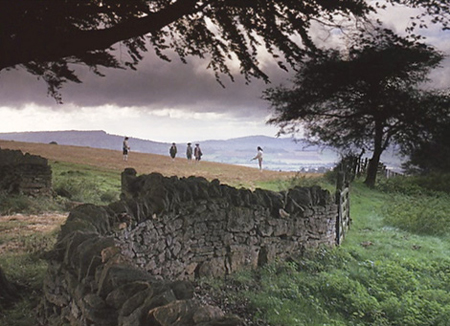 THE LONG VIEW: The first shot—Barry Lyndon’s father being killed in a duel—establishes
THE LONG VIEW: The first shot—Barry Lyndon’s father being killed in a duel—establishes
the style and manner in which the film communicates;
"The thing that Kubrick goes after is what's being guarded, denied. Kubrick has a divining rod for the concealed, alienating secrets of characters. He aims the lens at it, moves in slowly, and brings in the violins. It's the music, the restraint in the performances, the scrutiny of the camera that allows you to register the subtlest expressions on, for example, Nora's face when she allows a trace of irritability and impatience to escape. Kubrick sensitizes you to such a profound degree. What the style does is confront you in the most inescapable way with the concealed truths of their passions, making you feel and experience what is being hidden. It's the counterpoint between the idyllic representation and beautiful lighting, and the almost nauseous degree of passion that is felt."
Miller will frequently key into the society that prevents Kubrick's characters from speaking their minds and acting on impulse, which is why he feels Barry Lyndon is the yang to the yin of A Clockwork Orange, and that's why he is studying it for Foxcatcher, where he will have two characters operating in a murky field of psychological warfare. "All of the maneuvering and psychological manipulations need to somehow be understood without them ever being spoken," he explains.
As Barry jealously watches Nora dance with a suitor from the sidelines, Miller notes how Kubrick's camera placement continues to tell the story with economy. "Look at that weird framing. Barry Lyndon is displaced, uncomfortable in his own skin. Every frame is a perfect picture, subject in the crosshairs, and then you get to the shot of Barry tucked off to the side. It's the only frame of this whole sequence that is not a complete picture. It's an appendage.
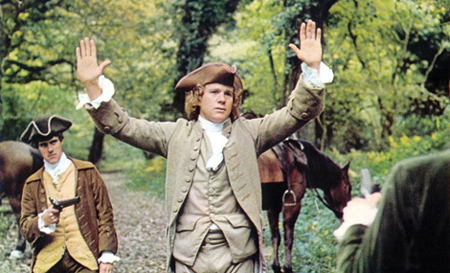 As Barry is held up by a thief and his son, Kubrick takes his time and “gives you [the space] to burn in it.”
As Barry is held up by a thief and his son, Kubrick takes his time and “gives you [the space] to burn in it.”"And now here, Barry's in the crosshairs," Miller points out later, as Barry sits at dinner with his family, about to throw a glass at the officer to whom Nora has become engaged. The shot of the long table is wide, the light soft and shadowy through the windows, though Barry is largely lit. "I've heard criticism of Ryan O'Neal in this part but he's perfect, so vulnerable. Look at how he clocks this news of the engagement and the way Kubrick lets it happen without punching in. O'Neal's performance is tempered to the shot; the performance fits the lens choice as well as the stillness. I don't think you could receive or fathom what this film has to offer if there was any more freneticism than this nearly perfect stillness. It's like a body of water: the stillness and austerity allow you to see beneath the surface."
After insulting the officer, Barry stands opposite him in a field for a duel, in another conflict constrained by societal ritual. The camera lingers on the players as decisions are made, cutting between them, backed by an unconventional but tension-building music choice.
"When you think about suspense, you think violins and tremolo, but this is just timpani and cello plucking, and I have to remind myself to breathe. It's like a disaster happening in slow motion. Thirty seconds into this movie you just feel dread and it slowly, methodically pushes you towards the buzz saw. The style feels like the way Bobby Fischer played chess, which was not tricky. He would play a centuries-old opening, basically declaring his intentions, but the mastery and indomitability with which it was executed made it crushing. Kubrick takes an inherently dramatic situation, slows it down, and confronts you with the thing that matters, the mortal issue at hand. Of course, I don't think he moves slowly; I think he is operating in a mode that doesn't really adhere to linear time. He creates an amplification of an experience that puts you in it."
Thinking he has killed the officer in the duel, Barry flees but soon falls prey to an extremely cordial and high-mannered father and son stickup team, as the camera floats beneath him approaching through the woods on his horse.
"This scene is brilliant," exclaims Miller with anticipation, the thief revealing his pistol with a "Good morning again, young sir," his son flanking Barry from behind. "On the page it's nothing; it's a polite, orderly interaction but it strangles you. The fat beat before Barry speaks, the space Kubrick gives you to burn in it. This scene is about a guy getting violated and emasculated without anyone acknowledging it. These actors lay back and give Barry the rope with which to hang himself. The way Kubrick now begins to move, he's putting you into Barry's mind. Again, it's not simply the story, it's how it's observed; it feels like consciousness."
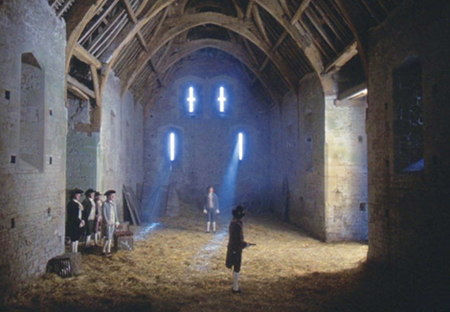 TRAGIC ENDING: The climactic duel in a stone barn with the light pouring in from openings
TRAGIC ENDING: The climactic duel in a stone barn with the light pouring in from openings
in the wall is a seemingly impossible nine-minute scene of lingering shots.Much has been written on Kubrick's great reliance on natural light to make Barry Lyndon, as well as the high-speed, retrofitted f/0.7 Zeiss lenses designed for NASA Kubrick used to shoot, so Miller refrains from a detailed retelling. However, when Barry reunites with Captain Grogan (Godfrey Quigley), a father figure from back home, in a scene lit solely by three candles, Miller notes the effect.
"This is the 0.7 lens," he says. "You see how shallow the depth of field is? Barry's eyes are in focus but his eyebrows and sideburns are not. They're each about a foot away from those three candles. That's literally the speed of that lens, three foot-candles. That's what a wide-open 0.7 lens looks like."
After Grogan's death in battle, Barry deserts the military, stealing an officer's identity papers, but is soon asked to present them when stopped on the road by a Prussian officer, Captain Potzdorf (Hardy Krüger).
"This is a genius cut," Miller motions as Barry hands them over and the shot changes from a wide one on Potzdorf to close-up on Barry. "Dynamic stillness. Barry is stonewalling it but you know he's on the verge of being found out. He's silently freaking out so we stay with him instead of cutting to the officer reading the papers."
After a forced stint in the Prussian army, Barry finds a new father figure in the Chevalier de Balibari (Patrick Magee), a successful gambler and cheat, masquerading as nobility through the most reputable courts of Europe.
"That's what a predator looks like on the Serengeti," says Miller as Barry and the chevalier gaze across the garden at Lady Lyndon (Marisa Berenson), whom Barry has decided to seduce, steal away from her ailing husband, then marry once he dies. Their profiles frame the shot, which then pushes past them to capture their POVs.
"I think it's not so much the shot but how the entire movie loads this moment. He'd been dispelled of the romantic notions that he'd been born with, so this idyllic painting of this privileged world now takes on a different quality than if you're just looking at that painting. It's as if you're looking at a painting through the crosshairs of a hunting rifle. The film has established that all appearances belie realities more uncertain and disturbing than one would imagine. Barry's going to prey on these people … and now, here … a longer lens POV …. Very hunterly." A wordless and slow candlelit seduction of glances ensues while Barry cons Lady Lyndon at cards, this time not the timid boy he was with Nora. "Also part of the craft is the command and understanding over the time and culture, and Kubrick really became a world authority on that period," Miller adds, observing the manners and rituals Kubrick has replicated.
When Barry follows Lady Lyndon into the night air at a dreamlike pace and kisses her when she turns, Miller sighs deeply. "Nothing said. It's like a ballet. There's a shot of her outside and a tracking shot of his entrance, and then it just settles. He takes her hand, they kiss, and to my constitution it's about as much as my heart and blood pressure can take. That it happens at this pace and with this deliberateness is dictated by the necessity to make that kiss feel as transcendent, redemptive, and fulfilling as she experiences it. Haiku. I don't know how you achieve the satisfaction that scene requires being other than this deliberate and unflinching. What makes it work is that Kubrick has earned it; you've become sensitized to who Barry has become, and so quickly to what she might be feeling, and how these two people might connect and satisfy each other in some way."
After marrying and squandering Lady Lyndon's fortune, her jilted and sensitive son, Lord Bullingdon (Leon Vitali), challenges the now ruined Barry to a duel. The seemingly impossible nine-minute scene of lingering shots that get into their anxious minds, unrelenting score, and unnerving flapping of pigeon wings in the darkened, echoing stone barn cause Miller to shake his head in disbelief. In the most deliberate and torturous exchange, Barry and Lord Bullingdon trade three shots, making profound choices to proceed at every turn until Barry is hit in the leg, eventually sending him into exile from the society he had ascended.
"It's nine minutes and not a frame too many. It works because Kubrick invests completely in the actual drama: who these people are, what do they need to overcome to get what they want, and that there's no alternative. It's tragic for everybody—watch the officials cringing. It's like everybody is a slave to the event. And how haunting and disturbing is this setting?
Miller takes a moment after the climactic scene, as if transformed—again—by the experience. "I will say that the style Kubrick uses here is perhaps the most unforgiving possible," he concludes. "Meaning, you are so exposed. He is heightening your sensitivity to such a degree that any aberrant detail is going to scream at you. You can't afford a bad extra. This scene is perfection. It's a full-on, unflinching look into a condition that I think must feel familiar to anybody who's toiled on this planet with his or her eyes open. It brings into relief the manners, politics, and cruelties of how the world works. It's just painful in the most satisfying way possible because you recognize it as truthful. It really is Kubrick's eye, what it goes to, and its sensitivity to the details that do communicate."